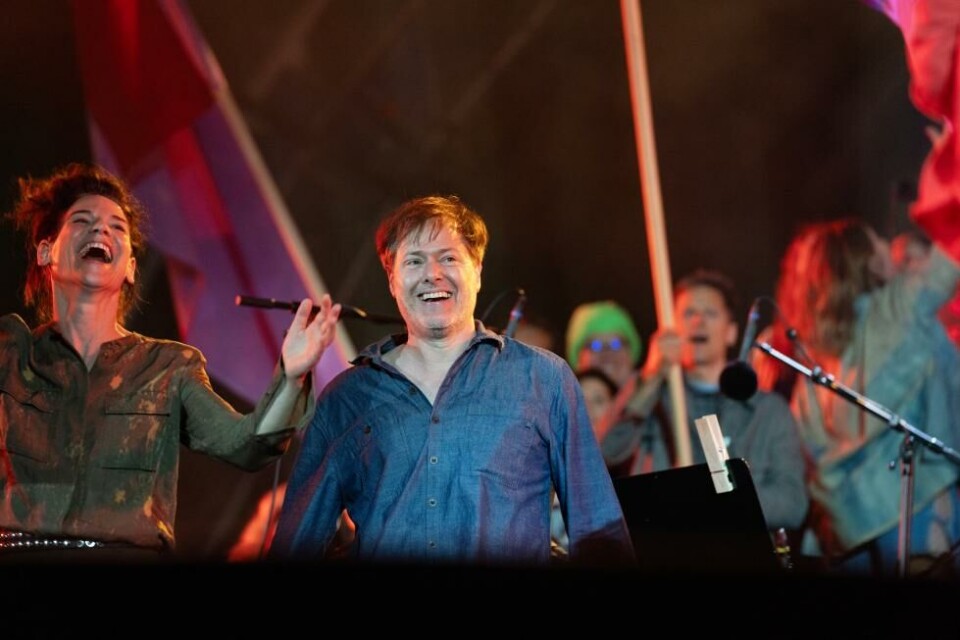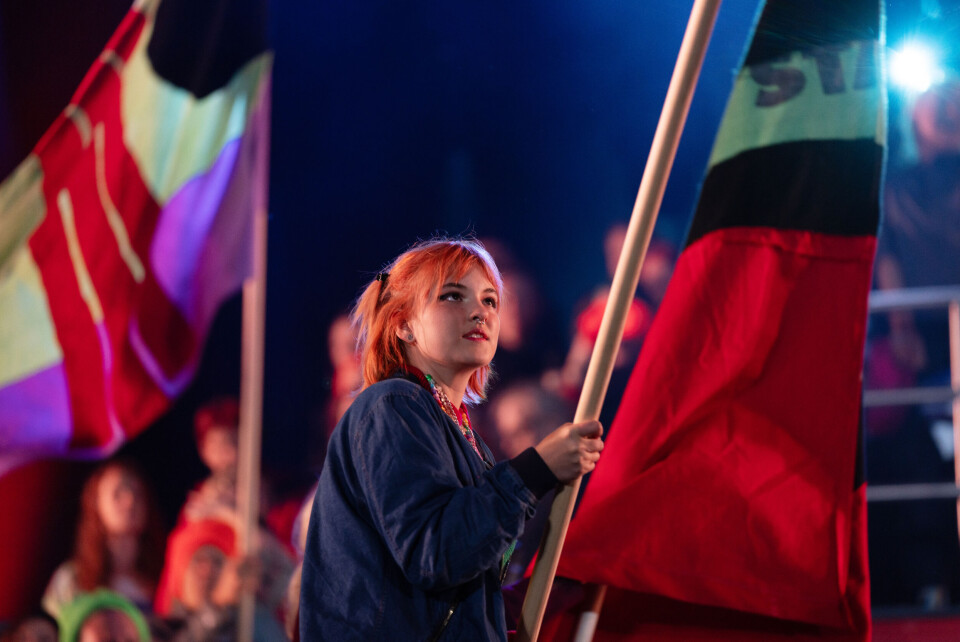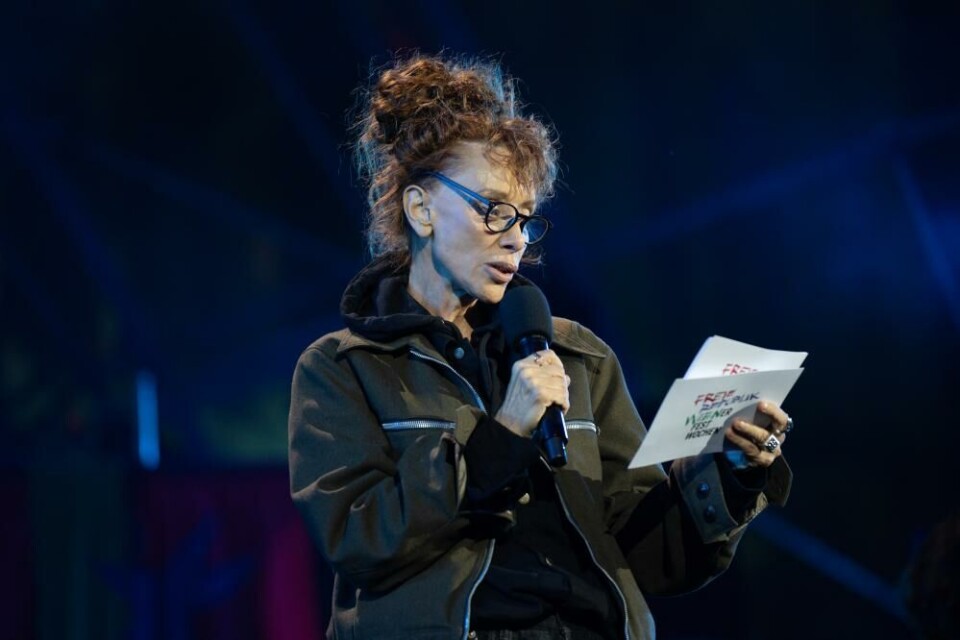
A revolution in neon!
“We Come in Peace” – Balaclavas, Controversy, and Declaring a Free Republic: Reflections from the Opening of Wiener Festwochen
Norwegian version here.
On a cool, cloudy Friday night, 36,000 people flocked outside Vienna’s Rathaus for the grand opening the 2024 Wiener Festwochen, one of Europe’s most important multidisciplinary art festivals. This crowd had arrived hoping for something special in this, the first iteration of the festival under the direction of controversial Swiss-German director Milo Rau.
Rau – one of Europe’s most important directors – is known for his politically engaged (at times enraged) theatre which over the past fifteen years included reenactments of historical traumas and true crimes, biographic pieces connecting actors to larger political and social movements, classic texts from Aeschylus to the Bible staged in (post)conflict zones from Brazil to Iraq, and impossible assemblies and tribunals exploring artistic freedoms and economic inequalities from Moscow to Berlin to Bukavu. With an impressive resume including honorary doctorates from Ghent University (Belgium) and Lund University (Sweden), numerous books, exhibition projects, world tours, a five-year tenure as artistic director of the Belgian city-theatre Nederlands Toneel Gent (NTGent), and countless partnerships with activists, politicians, artists, and academics across the globe, Rau brings a uniquely political aesthetic and socially engaged eye unlike any other to the festival.
Rau is a lightening-rod for controversy and the lead-up to his first Festwochen was no exception.
The new artistic director received his first dose of criticism when the festival invited the Greek-Russian conductor Teodor Currentzis – heavily criticized for the funding his orchestra has received from Putin-funded banks – to perform War Requiem, which was to act as a partner piece to Kaddish Requiem ‘Babyn Jar’ with the Kyiv Symphony Orchestra and Ukrainian conductor Oksana Lyniv. After an explosion of critiques for one of Europe’s most important (and publicly funded) festival’s giving a platform to someone who’s work is being supported by a regime actively promoting war and the colonization of Ukrainian territory. Ultimately Rau and the festival cancelled Currentzis’s concert.
Perhaps more complicated is the controversy surrounding Rau and the festival and the European conversation around Israel and Palestine. In recent weeks, Rau has been accused of antisemitism for inviting public figures labeled pro-Palestinian and Israel critical, which, within the German and Austrian context, has become synonymous with antisemitism. But in response Rau doubled-down, even inviting the controversial, Zionism-critical Israeli philosopher Omri Boehm to give the “Address to Europe”. Even the Republic’s flag has been criticized for apparently looking “too Palestinian”. But Rau’s willingness to even engage in a multi-dimensional dialogue around Israel and Palestine (albeit carefully and without ever really voicing his own opinion) is notable for an artist working in Germany and Austria, which – for some rather obvious historical reasons – have wholly sided with the State of Israel to the point that any critique of Israel is called antisemitism and pro-Hamas and which has resulted in the overwhelming repression of voices supporting innocent Palestinian people living in Gaza.
Rau’s trouble began when he announced the inclusion of French author and Nobel Prize winner Annie Ernaux and Greek economist and former finance minister Yanis Varoufakis – both considered “too critical” of Israel for Austrian (and German) political sensibilities – in his Council of the Republic (which includes Viennese citizens and public figures alongside numerous other well-known public figures Rau has enjoyed being photographed alongside in recent weeks). Cries of protest began almost immediately from politicians and other public groups to remove the two from the Festwochen program. But, much to Rau’s credit as a political artist, he refused to back down, even criticizing the frequency with which “antisemitism” is thrown around these days and the danger this poses when identifying real antisemitism. He also highlighted the need for debate and difference to exist, stating in a recent article: “Wars begin in this impossibility of listening, and I find it sad that we Europeans are repeating war at our level.”

The festival’s much-anticipated opening event bypassed the usual constellation of stuffy political speeches and mixture of classical and cheesy Schlager music on the massive temporary concert stage constructed at Vienna’s historical Rathausplatz. The festival opened with Austria’s red and white motif projected across the neogothic façade as classical music blared across the square. But the projection glitches, the music skips and cuts out to an unpleasant screech. As the projection flicks to the green, black, purple, and red of a broken computer screen, a video begins: an opening message for the public from inside the building. Seated at a long table within the Rathaus’s extravagant halls surrounded by white marble, velvet, and oil paintings is Rau, the German actor Bibiana Beglau, and Austrian musician Herwig Zamernik (aka Fuzzman).
“Hello,” says in Beglau, “this is the Free Republic of Vienna, coming to you directly from city hall. We come in peace.” Loud, rock music cuts in, interrupting the speech and ornate décor, Beglau, Rau, and Zamernik abandon the table and sprint towards the exit, throwing papers, knocking books, and disrupting the bureaucrats and trappings of bureaucracy as they make their way out of the building. Meanwhile a giant multicolored balaclava and numerous brightly coloured flags made of strips of red, purple, green, and black fabric unfurl on the outdoor stage and a balaclava-clade mob stormed the stage, cheering, chanting, and waving the Republic’s mosaic flags. The giant balaclava drops, revealing the podium and stairs the mob now joyously occupies as Beglau, Rau, and Zamernik join them onstage.
The Free Republic of Vienna, die Freie Republik Wien – has been declared and for the next five and a half weeks – with its 47 productions and projects in a program that includes theatre, opera, music, dance, performance, art exhibitions, discussion series, and activism – we’re all just living in it.

The evening combined high-energy music performances from Fuzzman & The Singin’ Rebels, Pussy Riot, Bipolar Feminin, Voodoo Jürgens & Die Ansa Panier, Gustav, Paula Carolina, and Monobrother with political speeches and pragmatic reflections from the likes of no less than Elfriede Jelinek, Carola Rackete, Kid Pex, Kim de l’Horizon, Mateja Meded, Stas Zhyrkov, KDM, and Sibylle Berg. This opening jubilation, this celebration situated the festival not as a place of solemn reflection and anti-political, bourgeois art, but as an active player in the political and social struggles dominating public discourse. The pièce de résistance of the evening was the unveiling of the Republic’s new hymn – an anthem for the festival – which calls on citizens to stand up for human rights, for people everywhere, against fascists, to make their voices heard, and to hold out hope in this new Republic. This festival opening – not without controversy – was a battle cry for the future: A revolution in neon!
(Published Norsk Shakespearetidsskrift, 05.22.2024)
